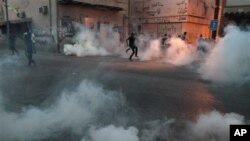DUBAI —
Bahrain’s opposition has rejoined national reconciliation talks following a two-week boycott over the slow pace of dialogue and a reported crackdown by security forces.
Bahrain’s main opposition party al-Wefaq, in collaboration with other opposition forces, announced the boycott on May 22.
The group said the decision came after “hundreds of citizens” were arrested and scores of homes were raided including that of a prominent Shi’ite cleric, Ayatollah Sheikh Issa Qassim.
The national dialogue, which began in February, is aimed at resolving roughly two years of political deadlock following a Shi’ite-led, pro-democracy uprising that Bahrain's Sunni government quelled in 2011.
The talks, so far, have yielded minimal results.
The opposition continue to reject the structure of the dialogue, insisting that a member of the royal family should participate and that Bahraini citizens, rather than the king, should approve the final recommendations.
Salman al-Jalahma, a spokesperson for Bahrain’s Information Affairs Authority, says al-Wefaq’s obstinance is preventing participants from addressing important political and social grievances.
“These provocations are impeding the process and not allowing room for it to actually address the problems and move on, so we’re hoping all participants will actually engage in constructive and meaningful dialogue instead of reopening cases that have already reached a consensus and delaying achieving a consensus on issues that are actually important,” al-Jalahma said.
Al-Jalahma also criticized the opposition for its recent boycott of the talks.
"Essentially these sessions are a trust building exercise and you need to acknowledge that there will always be different opinions and the aim of the dialogue is to discuss these differences and not stop and halt at any point when someone has a disagreement," he said.
Al-Wefaq says it is ready to compromise but says talks will be futile unless certain stipulations are met. It says its boycott was meant to underscore this.
“We want to send a signal that if we really want to get out of the problems in Bahrain, we need a serious dialogue,” said Abdul Jalil Khalil Ebrahim, a spokesperson for the party.
As the stalemate drags on, violence continues in the streets.
Shi’ite neighborhoods provide the backdrop for near-nightly skirmishes between protesters frustrated with the slow pace of reform and security forces.
Ebrahim says a political solution is desperately needed, but that time is running out.
“We know this is the last chance for the people to honestly trust this dialogue, that’s why we want to push this dialogue. We don’t want to lose this opportunity, but to be very frank, we are not going to sit and waste our time for nothing another one month or two months,” Ebrahim said.
Rights groups say at least 80 people have been killed in Bahrain since unrest began in February 2011.
Bahrain’s main opposition party al-Wefaq, in collaboration with other opposition forces, announced the boycott on May 22.
The group said the decision came after “hundreds of citizens” were arrested and scores of homes were raided including that of a prominent Shi’ite cleric, Ayatollah Sheikh Issa Qassim.
The national dialogue, which began in February, is aimed at resolving roughly two years of political deadlock following a Shi’ite-led, pro-democracy uprising that Bahrain's Sunni government quelled in 2011.
The talks, so far, have yielded minimal results.
The opposition continue to reject the structure of the dialogue, insisting that a member of the royal family should participate and that Bahraini citizens, rather than the king, should approve the final recommendations.
Salman al-Jalahma, a spokesperson for Bahrain’s Information Affairs Authority, says al-Wefaq’s obstinance is preventing participants from addressing important political and social grievances.
“These provocations are impeding the process and not allowing room for it to actually address the problems and move on, so we’re hoping all participants will actually engage in constructive and meaningful dialogue instead of reopening cases that have already reached a consensus and delaying achieving a consensus on issues that are actually important,” al-Jalahma said.
Al-Jalahma also criticized the opposition for its recent boycott of the talks.
"Essentially these sessions are a trust building exercise and you need to acknowledge that there will always be different opinions and the aim of the dialogue is to discuss these differences and not stop and halt at any point when someone has a disagreement," he said.
Al-Wefaq says it is ready to compromise but says talks will be futile unless certain stipulations are met. It says its boycott was meant to underscore this.
“We want to send a signal that if we really want to get out of the problems in Bahrain, we need a serious dialogue,” said Abdul Jalil Khalil Ebrahim, a spokesperson for the party.
As the stalemate drags on, violence continues in the streets.
Shi’ite neighborhoods provide the backdrop for near-nightly skirmishes between protesters frustrated with the slow pace of reform and security forces.
Ebrahim says a political solution is desperately needed, but that time is running out.
“We know this is the last chance for the people to honestly trust this dialogue, that’s why we want to push this dialogue. We don’t want to lose this opportunity, but to be very frank, we are not going to sit and waste our time for nothing another one month or two months,” Ebrahim said.
Rights groups say at least 80 people have been killed in Bahrain since unrest began in February 2011.




